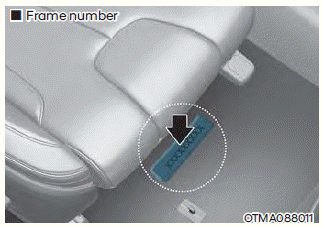Hyundai Santa Fe: Maintenance / Engine oil
Checking the engine oil level
Gasoline engine
1. Follow all of the oil manufacturer’s precautions.
2. Be sure the vehicle is on the level ground in P (Park) with the parking brake set and the wheels blocked.
3. Turn the engine on and allow the engine to reach normal operating temperature.
4. Turn the engine off and wait about 15 minutes for the oil to return to the oil pan.
5. Pull the dipstick out, wipe it clean, and re-insert it fully.
.png)
6. Pull the dipstick out again and check the level. The level should be between F (Full) and L (Low).
.png)
7. If it is near or at L, add enough oil to bring the level to F.
Use only the specified engine oil (Refer to “Recommended Lubricants and Capacities” section in chapter 2).
NOTICE
To prevent damage to your engine:
- Do not overfill with engine oil. Add oil in small quantities and recheck level to ensure engine is not overfilled.
- Do not spill engine oil when adding or changing engine oil. Use a funnel to help prevent oil from being spilled on engine components. Wipe off spilled oil immediately.
 Explanation of scheduled maintenance items
Explanation of scheduled maintenance items
Engine oil and filter
The engine oil and filter should be changed at the intervals specified in the
maintenance schedule. If the vehicle is being driven in severe conditions, more
frequent oil and filter changes are required...
 Checking the engine oil and filter
Checking the engine oil and filter
We recommend that the engine oil and filter be changed by an authorized HYUNDAI
dealer according to the Maintenance Schedule at the beginning of this chapter...
Other information:
Hyundai Santa Fe (TM) 2019-2025 Service Manual: Warning Indicator. Repair procedures
Inspection 1. Disconnect the negative (-) battery terminal. 2. Remove the front door trim. (Refer to Body - "Front door trim") 3. Disconnect the power door mirror connector from the harness BCW indicator Removal 1...
Hyundai Santa Fe (TM) 2019-2025 Owner's Manual: Front lamps
Front map lamp ( ): Touch either icons to turn the map lamp on or off. This light produces a spot beam for convenient use as a map lamp at night or as a personal lamp for the driver and the front passenger. Door lamp (): The front or rear room lamps come on when the front or rear doors are opened...
Categories
- Manuals Home
- 4th Generation Santa Fe Owners Manual
- 4th Generation Santa Fe Service Manual
- Seat cushion extension adjustment (for driver's seat)
- Engine Control System
- Electronic Parking Brake (EPB) warning light. AUTO HOLD indicator light
- New on site
- Most important about car
Vehicle Identification Number (VIN). Vehicle certification label. Tire specification and pressure label
Vehicle Identification Number (VIN)

The vehicle identification number (VIN) is the number used in registering your vehicle and in all legal matters pertaining to its ownership, etc.
The number is punched on the floor under the passenger seat. To check the number, open the cover.
